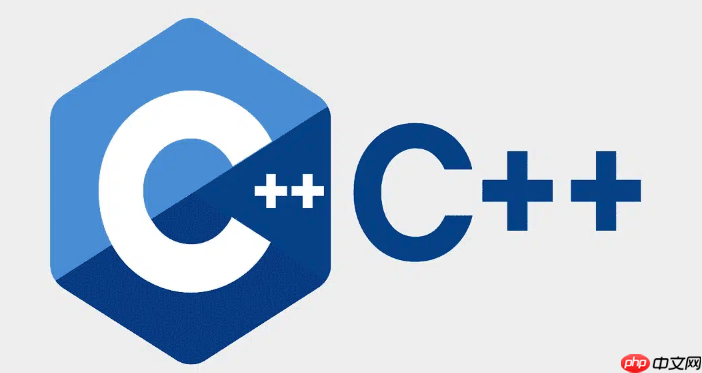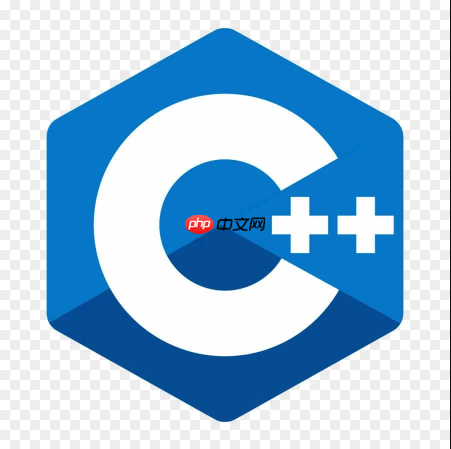
C++联合体变体记录是一种在有限内存空间内存储多种不同类型数据的高效策略,它通过在运行时追踪当前存储的数据类型,实现了类型安全的多态存储,是处理异构数据集合时的一个强大工具。
解决方案在C++中实现多类型存储,我们有几种主要方案,从传统的C风格联合体到现代C++的
std::variant,每种都有其适用场景和权衡。
-
C风格联合体(Raw Union)与手动判别器 这是最底层、最节省内存的方式。一个
union
可以容纳其所有成员中占用空间最大的那个成员,但同一时间只能有一个成员是“活跃”的。为了确保类型安全,你需要一个额外的“判别器”(通常是一个enum
类型)来记录当前联合体中存储的是哪种类型。enum class DataType { Int, Double, String }; struct MyVariant { DataType type; union { int i; double d; // 对于非平凡类型,如std::string,直接放在union里非常危险, // 需要手动管理其生命周期(placement new/explicit destructor call)。 // 更多时候,我们会放一个指针或固定大小的缓冲区。 // 这里为了演示,假设我们能安全处理(实际生产中需谨慎)。 char str_buf[32]; // 假设字符串最大31字符+null } data; // 构造函数和析构函数需要手动管理data成员的生命周期 MyVariant() : type(DataType::Int) { data.i = 0; } // 默认构造 ~MyVariant() { if (type == DataType::String) { // 假设str_buf是std::string,需要手动调用析构函数 // reinterpret_cast<std::string*>(&data.str_buf)->~basic_string(); } } // 赋值操作符也需要特殊处理 };这种方式虽然极致地节省内存,但其类型安全和生命周期管理完全依赖于开发者,极易出错。
-
std::variant
(C++17及更高版本) 这是现代C++推荐的、类型安全的多类型存储方案。std::variant
是原始联合体的类型安全封装,它内置了判别器,并自动处理所包含类型的构造和析构。#include <variant> #include <string> #include <iostream> // 可以存储int, double, 或 std::string std::variant<int, double, std::string> my_modern_variant; my_modern_variant = 10; // 存储一个int std::cout << "Current value: " << std::get<int>(my_modern_variant) << std::endl; my_modern_variant = 3.14; // 存储一个double std::cout << "Current value: " << std::get<double>(my_modern_variant) << std::endl; my_modern_variant = "Hello, Variant!"; // 存储一个std::string std::cout << "Current value: " << std::get<std::string>(my_modern_variant) << std::endl; // 使用std::visit进行多态操作 std::visit([](auto&& arg) { using T = std::decay_t<decltype(arg)>; if constexpr (std::is_same_v<T, int>) { std::cout << "It's an int: " << arg << "\n"; } else if constexpr (std::is_same_v<T, double>) { std::cout << "It's a double: " << arg << "\n"; } else if constexpr (std::is_same_v<T, std::string>) { std::cout << "It's a string: " << arg << "\n"; } }, my_modern_variant);std::variant
提供了强大的类型安全保证,并简化了复杂类型的生命周期管理,是大多数场景下的首选。 -
自定义带有判别器的结构体(适用于C++11/14) 在
std::variant
出现之前,或者当你有特定需求时,可以手动构建一个包含原始联合体和判别器的结构体,并手动实现其构造、析构和赋值逻辑,以确保类型安全和正确的生命周期管理。这本质上是std::variant
的简化版手动实现。#include <iostream> #include <string> #include <new> // For placement new enum class MyCustomType { Int, Double, String }; struct CustomVariant { MyCustomType type; union { int i_val; double d_val; char s_buf[sizeof(std::string)]; // 足够存储一个std::string的原始内存 } data; CustomVariant() : type(MyCustomType::Int) { new (&data.i_val) int(0); } // 构造函数:int CustomVariant(int val) : type(MyCustomType::Int) { new (&data.i_val) int(val); } // 构造函数:double CustomVariant(double val) : type(MyCustomType::Double) { new (&data.d_val) double(val); } // 构造函数:std::string CustomVariant(const std::string& val) : type(MyCustomType::String) { new (&data.s_buf) std::string(val); } // 构造函数:std::string (右值引用) CustomVariant(std::string&& val) : type(MyCustomType::String) { new (&data.s_buf) std::string(std::move(val)); } // 析构函数:根据类型手动调用析构 ~CustomVariant() { destroy_current(); } // 拷贝构造函数 CustomVariant(const CustomVariant& other) : type(other.type) { copy_from(other); } // 拷贝赋值运算符 CustomVariant& operator=(const CustomVariant& other) { if (this != &other) { destroy_current(); type = other.type; copy_from(other); } return *this; } // 移动构造函数 CustomVariant(CustomVariant&& other) noexcept : type(other.type) { move_from(std::move(other)); } // 移动赋值运算符 CustomVariant& operator=(CustomVariant&& other) noexcept { if (this != &other) { destroy_current(); type = other.type; move_from(std::move(other)); } return *this; } // 获取值的方法 (需要类型安全检查) template<typename T> T& get() { // 这里应该有运行时类型检查,如果类型不匹配则抛出异常 if constexpr (std::is_same_v<T, int>) { if (type == MyCustomType::Int) return *reinterpret_cast<int*>(&data.i_val); } else if constexpr (std::is_same_v<T, double>) { if (type == MyCustomType::Double) return *reinterpret_cast<double*>(&data.d_val); } else if constexpr (std::is_same_v<T, std::string>) { if (type == MyCustomType::String) return *reinterpret_cast<std::string*>(&data.s_buf); } throw std::bad_cast(); // 或者其他错误处理 } // 辅助函数:销毁当前活跃成员 void destroy_current() { if (type == MyCustomType::String) { reinterpret_cast<std::string*>(&data.s_buf)->~basic_string(); } // int和double是平凡类型,无需手动析构 } // 辅助函数:从other拷贝 void copy_from(const CustomVariant& other) { if (other.type == MyCustomType::Int) { new (&data.i_val) int(other.data.i_val); } else if (other.type == MyCustomType::Double) { new (&data.d_val) double(other.data.d_val); } else if (other.type == MyCustomType::String) { new (&data.s_buf) std::string(*reinterpret_cast<const std::string*>(&other.data.s_buf)); } } // 辅助函数:从other移动 void move_from(CustomVariant&& other) { if (other.type == MyCustomType::Int) { new (&data.i_val) int(std::move(other.data.i_val)); } else if (other.type == MyCustomType::Double) { new (&data.d_val) double(std::move(other.data.d_val)); } else if (other.type == MyCustomType::String) { new (&data.s_buf) std::string(std::move(*reinterpret_cast<std::string*>(&other.data.s_buf))); // 移动后,需要确保other不再拥有该资源,防止other析构时再次销毁 // 对于std::string,移动后other通常处于有效但未指定状态,无需额外操作 } other.destroy_current(); // 销毁other的成员 other.type = MyCustomType::Int; // 将other重置为默认状态 } };这个例子展示了实现一个完整的自定义变体记录所需的复杂性,尤其是当涉及到非平凡类型时。它清晰地揭示了
std::variant
在背后为我们做了多少工作。
传统的C风格联合体,尽管在内存效率上无与伦比,但在多类型存储的场景下,确实隐藏着不少“雷区”。对我个人而言,除非是在极度受限的嵌入式环境,或者与某些古老的C API交互,我几乎不再直接使用裸联合体。它的核心风险在于缺乏内置的类型安全机制。
首先,未定义行为(Undefined Behavior, UB)是最大的隐患。联合体本身并不知道当前存储的是什么类型。如果你向联合体写入了一个
int,然后试图以
float的类型去读取它,那么恭喜你,你触发了UB。编译器对此束手无策,程序行为将变得不可预测,可能导致崩溃,也可能悄无声息地产生错误数据,这在调试时简直是噩梦。
其次,非平凡类型(Non-trivial types)的处理是另一个痛点。如果联合体的成员是带有自定义构造函数、析构函数或赋值运算符的类(比如
std::string),那么直接将它们放在联合体中,联合体本身并不会自动调用这些特殊的成员函数。这意味着你需要手动使用placement new来构造对象,并在不再需要时手动调用析构函数。这种手动管理生命周期的做法,代码冗长且极易出错,稍有不慎就会导致内存泄漏或双重释放。
再者,缺乏统一的接口和维护复杂性。当联合体中包含多种类型时,你通常需要一个外部的
enum判别器来指示当前活跃的类型。对联合体进行操作时,你不得不编写大量的
switch语句来根据判别器执行不同的逻辑。随着类型数量的增加,这些
switch语句会变得越来越庞大和难以维护。每次增加或修改类型,都需要修改所有相关的
switch分支,这无疑增加了代码的脆弱性。这种“手动挡”的操作方式,虽然提供了极致的控制力,但代价是极高的开发和维护成本。
std::variant如何成为C++多类型存储的现代解决方案?
std::variant自C++17引入以来,彻底改变了C++中多类型存储的范式。它就像是给传统的裸联合体穿上了一层坚固的、智能的“盔甲”,完美解决了裸联合体的诸多痛点,成为我个人在大多数场景下处理异构数据集合的首选。
std::variant最核心的优势在于其内置的类型安全机制。它内部维护了一个判别器,始终知道当前存储的是哪种类型。你不能错误地以
double类型去获取一个实际存储着
int的
variant,因为
std::get会在编译时或运行时进行类型检查,如果类型不匹配,会抛出
std::bad_variant_access异常,而不是导致未定义行为。这使得代码更加健壮和可预测。
另一个巨大的改进是它自动管理所包含对象的生命周期。无论你存储的是
int、
double还是复杂的
std::string、自定义类,
std::variant都会在赋值时自动调用新类型的构造函数,并在切换类型或
variant自身析构时,自动调用旧类型的析构函数。这完全消除了手动管理placement new和显式析构函数的繁琐和潜在错误,大大降低了开发者的心智负担。
std::visit是
std::variant的另一个杀手级特性。它提供了一种优雅、类型安全的方式来对
variant中存储的任何类型执行操作,完美替代了冗长的
switch语句。你可以传递一个函数对象、lambda表达式或重载函数集给
std::visit,它会根据
variant的当前活跃类型,自动调用对应的处理逻辑。这不仅让代码
以上就是C++联合体变体记录 多类型存储方案的详细内容,更多请关注知识资源分享宝库其它相关文章!







发表评论:
◎欢迎参与讨论,请在这里发表您的看法、交流您的观点。